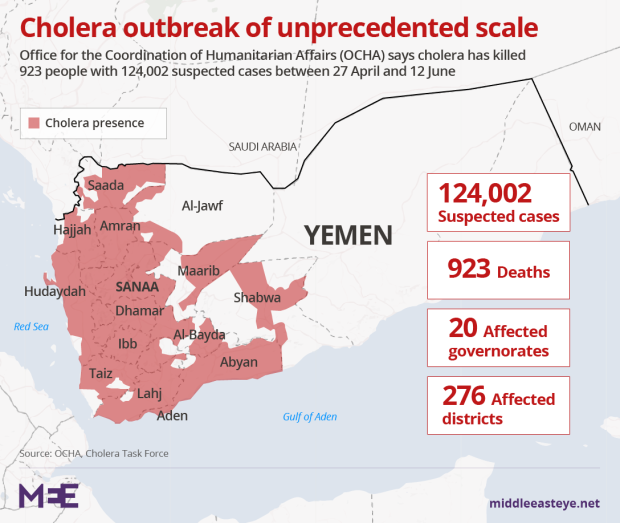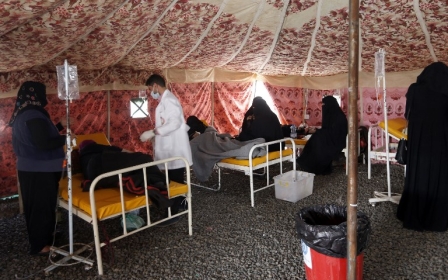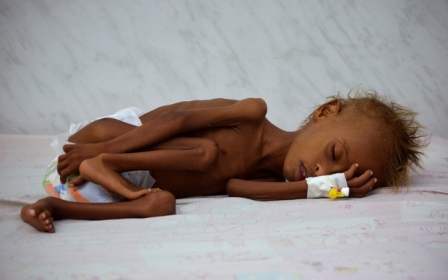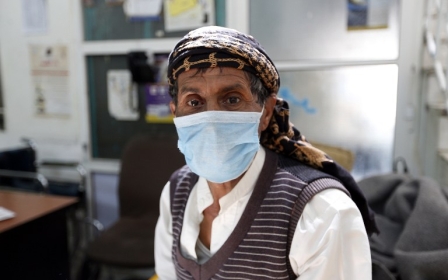One child infected every 35 seconds in Yemen cholera crisis

In Yemen, cholera is spreading so quickly that one child is infected nearly every 35 seconds, according to Save the Children.
The infectious disease, which is spread via contaminated food and water, can prove fatal if not treated quickly, and is already killing around 30 people each day.
Some 942 cholera-related deaths have been registered, and the rate of infection has more than tripled over the past two weeks.
Dr Mariam, a doctor working in Hodeida on Save the Children’s cholera response, said the situation was critical.
You can see the fear in the eyes of the mothers, they are afraid to lose their children, their husbands, their relatives
- Dr Mariam, doctor at cholera clinic
“You can see the fear in the eyes of the mothers, they are afraid to lose their children, their husbands, their relatives,” she told MEE.
Children have proved most susceptible she said, as most are already suffering from malnutrition, so their immunity is low.
And the infectious disease is spreading so quickly due to the lack of clean drinking water. “More than 60 percent of Yemeni people do not have access to clean water, what do you think the situation will be?”
While the treatment for cholera is simple, many patients do not manage to get help in time, she said.“There are a lot of people you cannot support... sometimes I feel so angry and depressed that I cannot help these people. I am a medical doctor,” she said, sounding exasperated.
“The war needs to stop. We need peace. We need aid,” she added.
“Children did not cause this war.”
While cholera treatment is easy and inexpensive, many patients are unable to access the help they need, given the ongoing Saudi-led war, which has in itself claimed at least 8,000 lives since it broke out in March 2015, according to the UN.
The region’s poorest country is on the verge of total collapse, and children are dying because they’re not able to access basic healthcare
- Grant Pritchard, Yemen country cirector for Save the Children
Many thousands more cholera-related deaths are expected, Save the Children says, with 300,000 new cases predicted in the coming months.
Over the last week, there have been around 5,470 new cases each day, and the outbreak is disproportionately affecting children, the NGO said.
Of suspected cholera cases, 46 percent are children under 15, it said in a statement. In total, nearly 70 percent of the population is in need of humanitarian assistance, including some 10 million children.
Yemen, the poorest country in the region even before the war broke out, is now on the verge of “total collapse,” said Grant Pritchard, Yemen country director for Save the Children.
“Disease, starvation and war are causing a perfect storm of disaster for Yemen’s people. The region’s poorest country is on the verge of total collapse, and children are dying because they’re not able to access basic healthcare,” he said.
“The cholera outbreak is overwhelming what remains of Yemen’s conflict-battered health system. Hospitals and treatment centres are struggling to cope with the large number of patients coming in from across the country. Medicines and intravenous fluids are quickly running out.”
Hospitals are overwhelmed and short of supplies, Save the Children said in a statement, due to “Yemen’s crippled infrastructure, food insecurity, failing economy and the ongoing war,” meaning many are unable to get help in time.
“The situation is particularly bad in more remote parts of the country with little or no access to health services. War, near-famine conditions and a complete breakdown in basic social services, including affordable transportation and access to clean water, are making the outbreak worse."
UNICEF warned that unless health workers are paid soon, more children will die.
The state has not paid many state employees for some months now, citing the war-time conditions.
“Without an urgent solution to pay health workers, more children will die – no matter how much humanitarian aid is delivered to the country,” Meritxell Relano, UNICEF’s representative in Yemen said on Tuesday.
UN aid chief, Stephen O’Brien, warned late last month that Yemen is spiralling towards "total social, economic and institutional collapse”.
Middle East Eye propose une couverture et une analyse indépendantes et incomparables du Moyen-Orient, de l’Afrique du Nord et d’autres régions du monde. Pour en savoir plus sur la reprise de ce contenu et les frais qui s’appliquent, veuillez remplir ce formulaire [en anglais]. Pour en savoir plus sur MEE, cliquez ici [en anglais].






